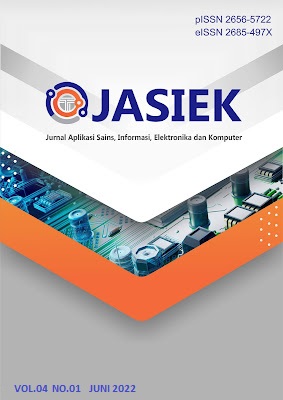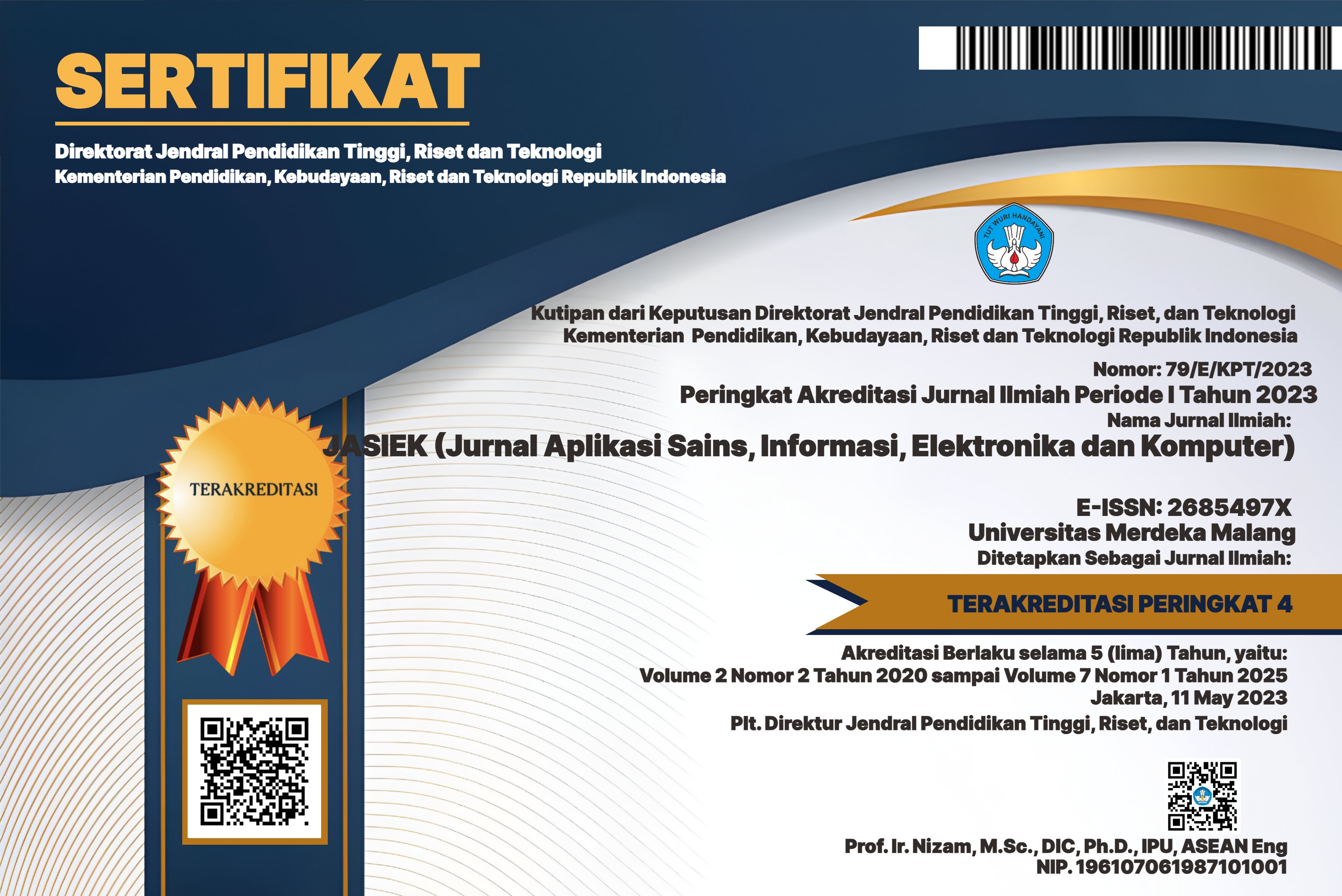Kontrol Suhu Air Pada Boiler Dengan Energi Gas Metana
DOI:
https://doi.org/10.26905/jasiek.v4i1.8402Keywords:
Gas Pressure, RTD PT 100, Water TemperatureAbstract
Currently, there are many industries that use alternative energy, namely waste energy that is converted into electrical energy, one of which is in the garden sector. Cow dung waste is processed into electrical energy at the Biogas Power Plant, some power plants are usually located in high mountains, which have a low ambient temperature, in this case 21°C. For the purpose of increasing methane gas production, efforts to increase the temperature of the cigar liquid above the ambient temperature of 21°C are attempted by adding boiler water with energy from the rest of the flue gas Covered In-Ground Anaerobi Reaktor (CIGAR) itself a liquid above 21°C. In this case, the waste waste Covered In-Ground Anaerobi Reaktor (CIGAR) is covered with a small Covered In-Ground Anaerobi Reaktor (CIGAR), to accommodate the methane waste. The methane will be used as energy to heat the air which has an initial average (21°C). The result of the air match will go to the mixing tank. The setpoint value at the stove temperature is 150-200 °C and the setpoint value at the maximum air temperature is 55 °C. In the air heating process, when the setpoint value is reached, the microcontroller will instruct the relay to turn off the gas by closing the gas input valve. The gas pressure needed for heating in the water heating process is about 2.2 KPa with a small gas discharge depending on conditions Covered In-Ground Anaerobi Reaktor (CIGAR) in the field. As a result, the water obtained has an average air temperature of 24.2°C with an average air discharge of 2 mâ„s × 379 .
Downloads
References
Mira, Mira, Taufik Iskandar, and SP Abrina Anggraini. "Pra Rancang Bangun Pabrik Biogas Dari Limbah Padat Pembuatan Tahu Dengan Kapasitas 4.865, 664 Liter/Tahun." eUREKA: Jurnal Penelitian Teknik Sipil dan Teknik Kimia 2.1 (2018): 122-128.
Kusumawardhani, Anggie, and Bahrul Fawaid. "Penerapan Biogas,
Konsumsi Susu Sapi serta Keluhan Diare Peternak Sapi Perah." Jurnal Ilmiah Permas: Jurnal Ilmiah STIKES Kendal 11.2 (2021): 285-296.
Margana, Cahyawan Catur Edi, and Asih Priyati. "Kajian Karakteristik
Digester Kotoran Sapi Berdasarkan Komposisi Air Berbasis Kinetika Gas Metana Untuk Produksi Gas Bio." Jurnal Ilmiah Rekayasa Pertanian dan Biosistem 5.1 (2017): 285-295.
Ramadania, Sinta Sri, And Mulyadi Mulyadi. "Sistem Pemantauan
Biodigester Menggunakan Mikrokontroler." Jurnal Borneo Saintek 2.2 (2019): 31-37.
Baehaki, Kiki. "Perancangan Biogas Fuel Meter (Bioler) Sebagai Sistem
Kontrol Gas Metana Pada Digester Pembangkit Listrik Tenaga Biogas (Pltbg)." Jurnal Online Mahasiswa (Jom) Bidang Teknik Elektro 1.1 (2018).
Ritonga, Abdul Mukhlis, And Masrukhi Masrukhi. "Optimasi Kandungan
Metana (CH4) Biogas Kotoran Sapi Menggunakan Berbagai Jenis Adsorben." Rona Teknik Pertanian 10.2 (2017): 11-22.
Rahmawan, Rizqi, Goegoes Dwi Nusantoro, and Erni Yudaningtyas.
"Sistem kontrol produk gas metana pada digester tipe fixed dome." Jurnal Mahasiswa TEUB 1.3 (2013).
Margana, Cahyawan Catur Edi, and Asih Priyati. "Kajian karakteristik digester kotoran sapi berdasarkan komposisi air berbasis kinetika gas metana untuk produksi gas bio." Jurnal Ilmiah Rekayasa Pertanian dan Biosistem 5.1 (2017): 285-295.
Downloads
Published
Issue
Section
License
Authors who publish with this journal agree to the following terms:
The journal allow the authors to hold the copyright without restrictions and allow the authors to retain publishing rights without restrictions.
Authors retain copyright and grant the journal right of first publication with the work simultaneously licensed under a Creative Commons Attribution-ShareAlike 4.0 International License that allows others to share the work with an acknowledgement of the work's authorship and initial publication in this journal.
Authors are able to enter into separate, additional contractual arrangements for the non-exclusive distribution of the journal's published version of the work (e.g., post it to an institutional repository or publish it in a book), with an acknowledgement of its initial publication in this journal.
Authors are permitted and encouraged to post their work online (e.g., in institutional repositories or on their website) prior to and during the submission process, as it can lead to productive exchanges, as well as earlier and greater citation of published work (See The Effect of Open Access).

This work is licensed under a Creative Commons Attribution-ShareAlike 4.0 International License.











